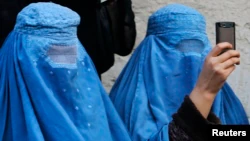Afghanistan: Taliban floggings hint at crackdown on smartphones
| Publisher | Radio Free Europe/Radio Liberty |
| Publication Date | 30 October 2018 |
| Cite as | Radio Free Europe/Radio Liberty, Afghanistan: Taliban floggings hint at crackdown on smartphones, 30 October 2018, available at: https://www.refworld.org/docid/5c34a7112.html [accessed 4 November 2019] |
| Disclaimer | This is not a UNHCR publication. UNHCR is not responsible for, nor does it necessarily endorse, its content. Any views expressed are solely those of the author or publisher and do not necessarily reflect those of UNHCR, the United Nations or its Member States. |
2018-10-30
By Frud Bezhan
 The recent flogging of two women in a Taliban stronghold area may have been due to the recent enforcement of strictures on the use of mobile devices, particularly smartphones, in militant-controlled areas. (illustrative photo)
The recent flogging of two women in a Taliban stronghold area may have been due to the recent enforcement of strictures on the use of mobile devices, particularly smartphones, in militant-controlled areas. (illustrative photo)
The scenes of a public flogging in a Taliban stronghold in northern Afghanistan showed two women in blue burqas kneeling nearly motionless as a man beat them over their heads and bodies with a cane.
The women, whose names have not been released, had been found guilty of breaking the Taliban's strict interpretation of Shari'a law after police said they visited a local health clinic without a male relative being present. They were also said to have been seen by Taliban fighters communicating on mobile phones.
While the fundamentalist Taliban has long forced women to be accompanied by a male relative when venturing outside their homes, reports of the second charge appear to point to the recent enforcement of strictures on the use of mobile devices, particularly smartphones, in militant-controlled areas.
It was unclear if the women, both of whom were married, were punished simply for using the phones or specifically for communicating with men outside their immediate families – a charge that has led to public floggings in the past.
While men on mobile devices are a common sight, local conservative culture frequently frowns on women using mobile phones in public.
Fear Of Drone Strikes, Surveillance
Obaid Ali, an expert on the Afghan insurgency at the Afghanistan Analysts Network, an independent think tank in Kabul, says the Taliban's cultural commission banned all fighters from using smartphones in 2016 for security and religious reasons. Since then, Ali says, the militants have enforced the ban on civilians in some areas under their control. But he says primitive mobile phones without Internet access or the ability to record images or video are tolerated in many of those same locations, which frequently lack fixed-line telephone services.
"One of the main reasons the Taliban banned smartphones was because of the growing threat of U.S. drone strikes and surveillance," says Ali. "The Taliban also fears smartphones being used among civilians because people can access independent information, take photos and videos, and might give away the militants' activities and locations."
The Taliban has restricted mobile-phone use in most areas under its control. In parts of the southern Helmand Province, mobile phones and the Internet are banned. Taliban fighters communicate via walkie-talkies.
In the northern Kunduz Province, where Taliban fighters control several districts, the group has forced mobile service providers to switch off coverage every day between 6:00 p.m. and 6:00 a.m.
Brutal Punishments
It was unclear if the women who were flogged in Jawzjan were using smartphones.
The incident occurred in the Beron Sena area of the Darzab district, a former stronghold of the Islamic State (IS) extremist group, which was ousted from the area by the rival Taliban and government forces in August.
Mohammad Ismail, Darzab's chief of police, this week confirmed that the floggings had taken place and said the incident occurred about 10 days ago. He said the women had since returned to their homes.
The news of the floggings only reached mainstream Afghan media on October 28. Videos purportedly showing the punishments have since been widely shared on social media.
'Moral Crimes'
This is not the first time the Taliban, which ruled the country from 1996 to 2001, has meted out public punishments for so-called moral crimes.
In the northern province of Faryab, a young girl was publicly flogged in a market last month for not being accompanied by a male relative.
Moral offenses, including adultery or even running away from home, are not considered crimes under the Afghan Criminal Code. But hundreds of women and girls have nevertheless been imprisoned after "immorality" verdicts by courts dominated by religious conservatives.
In some rural areas, where Taliban militants exert considerable influence, residents view government bodies as corrupt or unreliable and turn to Taliban courts to settle disputes. The Taliban courts employ Shari'a law, which prescribes public flogging, stoning, or execution for men or women found guilty of having a relationship outside marriage or an extramarital affair and for women who had contact with men outside their immediate families.
Recent years have seen a spate of chilling public punishments of women accused of such offenses.
In February 2017, an armed mob killed an 18-year-old woman and the man she had eloped with in the eastern Nuristan Province.
In October 2015, 19-year-old Rokhsana was stoned to death by Taliban militants in the central Ghor Province after being accused of having premarital sex.
In November 2015, a 26-year-old Afghan woman died of her injuries after being publicly lashed, also in Ghor. She had been accused of running away from home.
In August 2016, also in Ghor Province, a young man and woman found guilty of having sex outside marriage were publicly lashed.
Link to original story on RFE/RL website
